Want your perfect workout program?
Take QuizHow Long Does Semaglutide Stay In Your System?

Written by Kyle Ustach | BScEcon
Fact checked by Andrew Lenau, ISSA CPT & Sports Nutritionist
 FACT CHECKED
FACT CHECKED
We may earn a commission on purchases made through links on this page at no cost to you. Learn More
Obesity may seem like a life sentence for those who have struggled to lose weight their whole lives, but luckily, there are weight loss medications that can transform your life. One of the top weight loss medications available is semaglutide, the active ingredient in the popular Ozempic.
If you're starting or considering this step, a major consideration is how long the compound stays in your system. So, exactly how long does semaglutide stay in your system?
In this article, we will dive into semaglutide, how to flush Ozempic out of your system, and how long the effects last.
Table Of Contents
- What Is Semaglutide?
- How Long Does Semaglutide Stay In Your System?
- How to Get Semaglutide Out Of Your System
- Negative Side Effects Of Ozempic
- What Happens When You Stop Taking Semaglutide?
- FAQs
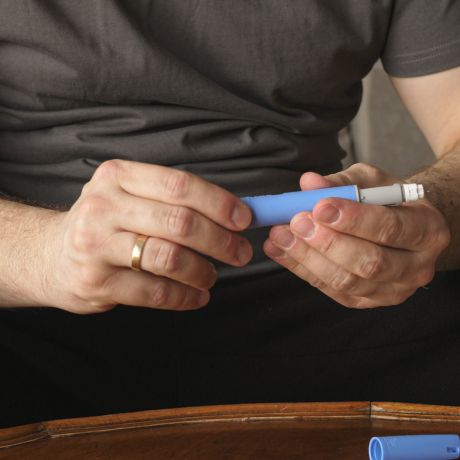
What Is Semaglutide?
Semaglutide is an exogenous compound referred to as a glucagon-like peptide-1 (GLP-1) receptor agonist. As such, it affects the body the same way a natural GLP-1 hormone does, causing insulin levels to increase and glucagon levels to decrease as a response to eating.
Since insulin helps to lower blood sugar levels, and glucagon increases them, managing this balance is key for optimal health. Semaglutide also helps increase the time it takes for food to pass through the stomach, absorbing nutrients slower to keep you full longer. In higher doses, it even helps reduce hunger and food cravings.
Thanks to its ability to improve blood sugar control, semaglutide was originally created as a type 2 diabetes medication. Later, clinical trials revealed remarkable weight loss properties, which expanded its use to chronic weight management.
Today, three brands of semaglutide are approved by the FDA, all of which are produced by Novo Nordisk: Ozempic, Rybelsus, and Wegovy.
Ozempic is a once-weekly semaglutide injection approved for weight management and type 2 diabetes treatment, while Wegovy is a weekly subcutaneous injection only prescribed for weight management. Rybelsus, in contrast, is a daily tablet that is only approved for type 2 diabetes. Despite their varying approvals, all three medications work similarly and can be used for weight loss.
How Long Does Semaglutide Stay In Your System?
Studies show that semaglutide has an extremely long half-life of about seven days, meaning it takes a week to eliminate 50% of the drug from the body (1). Studies have also shown that 94-97% of drugs will be eliminated from your system in four to five half-lives (2). As the Ozempic half-life is seven days, it will take roughly four to five weeks for semaglutide to leave your system.
For example, if you take the highest dose of Ozempic at 2 mg a week, you will have roughly 1 mg in your body the following week. At week two, there would be roughly 0.5 mg, 0.25 mg in week three, and so on, until it is negligible. If, for some reason, you miss a dose, contact your medical provider and take the missed dose immediately, as long as it's within five days. If it's over five days, skip the missed dose until your next dose.
How long does Ozempic stay in your system? Verdict: 4-5 weeks after the last dose.
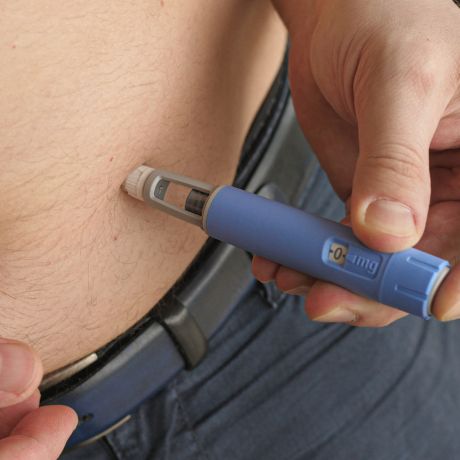
How To Get Semaglutide Out Of Your System
Unfortunately, there aren't any ways to flush semaglutide out of your system faster—you must wait for the half-lives to run their course after the last dose. However, anecdotal evidence suggests that staying hydrated is the key to surviving the harsh side effects.
In the sub-Reddit r/Ozempic, a post titled "Any way to flush Ozempic out of your system?" has several suggestions to focus on hydration.
User Ok_Lawyer_6609 suggests, "Drink electrolytes and water," (source) while user No_Personality_7477 echoes, "Water is the only way, good luck." (source)
Maintaining hydration appears to be an essential factor in flushing Ozempic out of your system.
Negative Side Effects Of Ozempic
Below are the most common side effects of semaglutide in general, as well as side effects specific to taking Ozempic.
Common Semaglutide Side Effects:
- Nausea (16-20%)
- Vomiting (5-9%)
- Diarrhea (8-9%)
- Abdominal pain (6-7%)
- Constipation (3-5%)
- Reduce appetite
Ozempic Specific Side Effects:
- Injection site irritation/pain
- Severe allergic reaction (rare)
It's important to consult with your healthcare provider if you experience any side effects. People who should avoid taking semaglutide medications include those with the following:
- Thyroid issues or thyroid cancer
- Gastrointestinal disorders
- Pancreatitis
- Hypoglycemia (low blood sugar)
- Kidney or liver issues
- Heart disease or cardiovascular events
- Women who are pregnant, breastfeeding, or planning on becoming pregnant
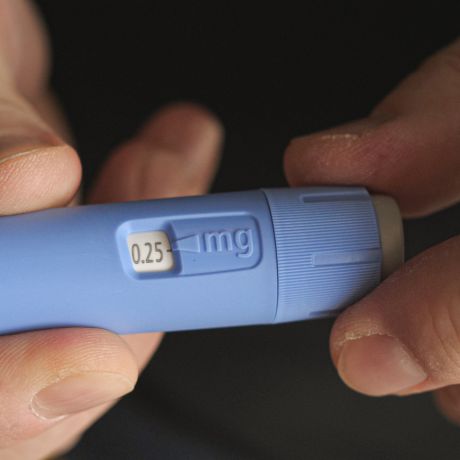
What Happens When You Stop Taking Semaglutide?
While there are no withdrawal symptoms, some people may experience side effects for a few weeks after stoppage until it is entirely removed from the body.
One common effect after stopping Ozempic is a dramatic increase in glucose in the blood, which can cause adverse effects like nausea and fatigue. This is especially dangerous for diabetes patients because the spikes in blood sugar can exacerbate symptoms like blurry vision, exhaustion, excessive thirst, and urination.
Another major change users will notice rather quickly, especially on high doses of semaglutide, is increased hunger. The medicine no longer tricks the brain into thinking it is full, so people may still feel hungry after eating or have food cravings. Unfortunately, this causes several people to regain weight.
To test this, one long-term study had participants take semaglutide injections for 68 weeks and then examined how much weight they regained one year after completion (week 120). After 68 weeks, participants lost an average of 17.3% of total body weight. However, after one year of being off the medication, participants gained back an average of 11.6%, for a net loss of only 5.6%. So, after one year of being off of semaglutide, users gained roughly two-thirds of the weight back (3).
On a positive note, side effects associated with semaglutide should subside rather quickly. It's possible to experience side effects for a few weeks after stopping due to the long half-life, but they should reduce in intensity.
To preserve your success and avoid weight gain:
- Stay consistent with your exercise routine.
- Stick to a healthy diet of nutritionally dense foods. Focus on lean proteins, complex carbohydrates, leafy green vegetables, and foods high in fiber to help keep you full longer.
- Avoid processed fats and sugary foods.
- Drink plenty of water.
Anecdotal evidence agrees that to maintain results, you must stay consistent with diet and exercise.
In the sub-Reddit r/Semaglutide, a thread titled "What happens when you stop taking it?" features several that agree with this sentiment. User danteafk stated, "If you don't add life-changing habits like exercise, healthier eating habits, less food, you'll regain everything you lost." (source)
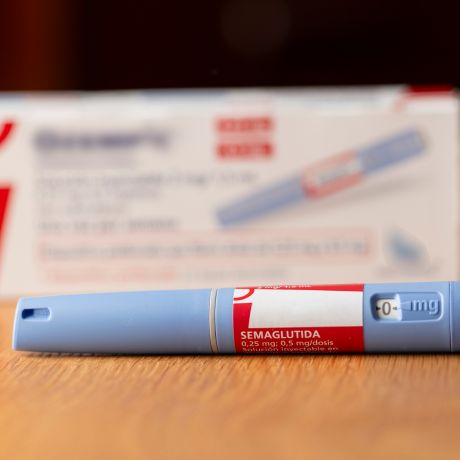
FAQs
These are some of the most commonly asked questions related to semaglutide.
How does semaglutide make you feel?
Due to a reduced appetite and slowing of the digestion process, many users feel gastrointestinal side effects. Many users experience fatigue in the early stages while their body adjusts.
How long can you take semaglutide?
Studies have shown that semaglutide is safe for 68 weeks or longer as long as side effects are manageable. Some suggest it's safe for up to two years or more.
When does semaglutide peak?
Semaglutide will peak in blood concentration after two to four hours. However, it may take four to eight weeks for the fat loss effects to peak because it takes that long to reach steady state levels in the body. For a more in-depth answer, check out our article How Long Does It Take Semaglutide To Work?
How long after taking Ozempic do side effects start?
Users typically experience side effects immediately or within the first few weeks, then slowly decrease as the body adjusts. Nausea and upset stomach can occur instantly with the first injection.
How long does .25 Ozempic stay in your system?
Despite being the low starting dose, 0.25 mg of Ozempic would stay in your system for roughly four to five weeks.
Can Ozempic cause low blood pressure?
Yes, Ozempic and semaglutide products can lower blood pressure levels.
Semaglutide In Your System: A Summary
An amazing prescription drug that helps treat type 2 diabetes and chronic weight management, semaglutide has an extremely long half-life of seven days.
Its half-life also explains why it can take weeks to kick in and reach steady state levels in the body. However, the long half-life also means the drug takes over a month to leave your system. It takes roughly four to five weeks for semaglutide to leave your system, and there are no ways to speed up the process.
While side effects will slowly disappear after stopping, your weight loss will also disappear if you are not careful. Be sure to stick to your diet and exercise routine to avoid gaining excess weight.
If you need help choosing the best semaglutide medication for your goals, check out our article Ozempic vs. Rybelsus: Which One Is Better? If you have second thoughts on semaglutide and want to compare it to other weight loss products, check out our article Liraglutide vs. Semaglutide: Uses, Differences, and Results.
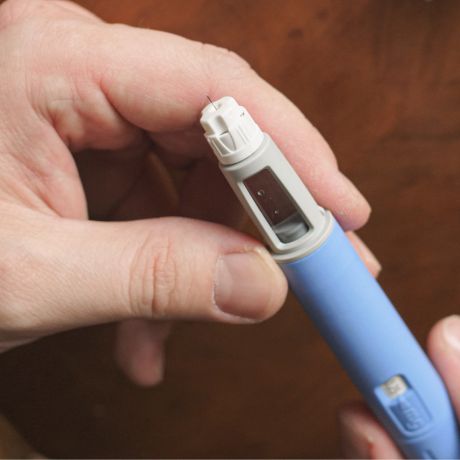
References
-
Mahapatra, Manoj Kumar, et al. "Semaglutide, a Glucagon-like Peptide-1 Receptor Agonist with Cardiovascular Benefits for Management of Type 2 Diabetes." Reviews in Endocrine and Metabolic Disorders, vol. 23, no. 3, 7 Jan. 2022, https://doi.org/10.1007/s11154-021-09699-1.
-
Hallare, Jericho, and Valerie Gerriets. "Half-Life." PubMed, StatPearls Publishing, 2020, www.ncbi.nlm.nih.gov/books/NBK554498.
-
Wilding, John P. H., et al. "Weight Regain and Cardiometabolic Effects after Withdrawal of Semaglutide: The STEP 1 Trial Extension." Diabetes, Obesity and Metabolism, vol. 24, no. 8, 19 May 2022, https://doi.org/10.1111/dom.14725.

Also in Blog
Recent Articles
-
A Healthy Grocery List For Weight LossMarch 27, 2025
-
19 100-Calorie Snacks To Support Weight LossMarch 26, 2025
-
14 Cheap Meal Prep Ideas ($2-$3 A Serving!)March 25, 2025
Must Reads
-
Mr Olympia 2024: What to Expect This Year (Oct. 10-13, 2024)September 11, 2024
-
What Can Walking For 1 Hour Everyday Do For You? My ExperienceFebruary 28, 2024
-
The Ultimate "Bro Split" Workout Plan (Backed By Science)August 05, 2023
- Blog
- Exercises
- Workouts
- Meal Plans
- SFS Programs
- Apparel
- About Us
- FAQ
- Shipping
- Warranty
- Contact Us
- Terms & Conditions
- Privacy Policy
- Affiliates
- SFS UGC Policy
- SFS MBG Policy
- Disclosures
- Legal Disclaimer
Sign up to get the latest on sales, new releases and more…
© 2025
SET FOR SET.
Powered by Shopify

















Kyle Ustach
Author